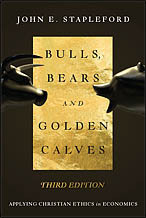Kindle Notes & Highlights
placid
inexorably
(disciple means learner),
the importance of self-interest,
As Douglas Vickers points out, it is then “a shallow myth, a misconception of humanist thought and in no sense a revelatory thought form of the Scriptures, to claim that all men are equal” with respect to economic resources and their standing in secular society.14
nowhere is the goal of an equal distribution of income mentioned.
Revolution, specialization generally led to individualism,
While sloth is a sin, and Christians in whatever they do are to do it heartily, “as working for the Lord, not for human masters” (Col 3:23),
Starting with Aristotle and continuing with Augustine through Thomas Aquinas, economics was considered part of the discipline of moral philosophy.
For Aquinas and the Scholastics, the commandment to “love your neighbor as yourself” extended to the marketplace and economic activity. Their main focus was on justice and distribution rather than production and exchange.
Theory of Moral Sentiments)
Smith focused on production and exchange,
The assertion is that economics can be an objective applied science, free from ideology, quantifying causal relationships on important issues that societies face in a complex world.
Nobel Prize–winning economist Milton Friedman asserts that,
The low-income households, however, must decide what to give up in order to continue to consume the higher-priced oranges.
Eve saw that the fruit of the tree was “desirable for gaining wisdom.” In the Hebrew the word “wise” used here (sakal) translates as “intelligent, expert, having success, to understand.”
Moses Maimonides, before this fall, humans had knowledge that was certain, unfailing and complete for their needs. God’s real punishment for eating the fruit was to push them beyond the limits of their reason.
and assumed that a democracy
would eventually dissolve into tyranny.
Plato concluded that the “ideal society” was one organized and contro...
This highlight has been truncated due to consecutive passage length restrictions.
Well-known early leaders included Francis Bacon, Voltaire, Isaac Newton and Adam
Smith’s mentor, David Hume.
the Enlightenment was simply freedom to use one’s ...
This highlight has been truncated due to consecutive passage length restrictions.
In his comprehensive book Intellectuals, historian Paul Johnson sweeps across the personal lives and writings of centuries of intellectuals from Jean-Jacques Rousseau to Bertolt Brecht to George Orwell to provide powerful insights into the character and motivations of these new secular clerics.
Rousseau, for example, treated his servant girl, Thérèse, as a disdained physical slave and had her abandon on the steps of French hospitals the five babies he fathered with her.
humans must choose between reason and faith.
“Love the Lord your God with all your heart and with all your soul and with all your mind and with all your strength” (Mk 12:30). The word Jesus uses for “mind” is interpreted as deep thought and understanding.
that a common characteristic of intellectuals is a disdain for the common person, an inclination to engage in the heartless tyranny of ideas.
Such a person is “poor in spirit,” which means “a complete absence of pride, a complete absence
of self-assurance and of self-reliance.
that a business’s one social responsibility is to maximize profits. Other economists argue that issues like human rights, environmental stewardship and community
impact should all be on a business’s radar screen.
the dominant force is self-love.
In some cases the banks simply lied, saying the accounts did not exist.9 Despite the size of the ultimate settlement, the estimated true present value of the funds stolen by the Swiss banks is $7.0 billion.10
The demand for men to work the mines rose as rapidly as the demand for the black ore.
Between 1870 and the outbreak of the First World War, 50,000 people died in American mines.
Coal mining today still has the highest fatality rate per hundred thousand workers among US industries, but total deaths per year are now between one hundred and two hundred.
Countries that engage in trade protectionism
have lower rates of economic growth, higher price-cost margins, reduced productivity, and may inhibit the diffusion of technology that occurs through imported capital and intermediate goods.
Trade barriers benefit a minority while punishing the majority, and thereby run contrary to major Christian ethical economic principles.
someone decided that profits were more important than safety, justice or fair prices.
“There is one and only one social responsibility of business—to use its resources and engage in activities designed to increase its profits, so long as it stays within the rules of the game, which is to say, engages in open and free competition, without deception or fraud.”
Company managers have one responsibility, says Friedman—to maximize profits within the bounds of the law. Friedman’s position has merit.
Successful Christian companies include Annie’s Pretzels, Cardone Industries and Chick-Fil-A, Inc., which closes its one thousand stores every Sunday. The four core values of high-profile Fortune 500 company ServiceMaster (“in the Master’s service”) are “To honor God in all we do, to help people develop, to pursue excellence, and to grow profitability.” According to C. William Pollard, ServiceMaster chairman and CEO:
“The Methodology of Positive Economics,” in Essays in Positive Economics
8D. Martyn Lloyd-Jones, Studies in the Sermon on the Mount (Grand
Rapids: Eerdmans, 1976), pp. 50-51.


